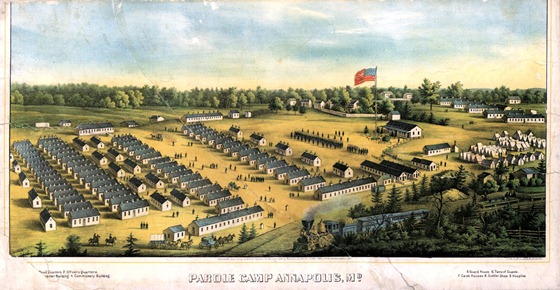July 31st, At midnight we all jumped out of bed in a hurry, startled by a heavy artillery fire, which at first could not be located. The men assembled on the color line without orders and remained there until the firing ceased, about an hour in all. It turned out to be a rebel field battery, sent under cover of darkness down the right bank of the James, to shell the numerous transports anchored near the landing. Our gunboats, ton jours pres, opened immediately with their big and little guns, but did not silence them for over an hour; curiously little or no damage was done while the possibilities were immense. Two of their shells burst quite close to our regiment, which indicates they did not get the range. When the firing ceased, we turned in again and were soon asleep.
Brigade inspection at half-past seven A. M., rations and ammunition inspected, as well as arms and accoutrements; our regiment was in fine order. Lieutenant-Colonel Parisen takes infinite trouble in seeing everything for himself. Shortly after nine o’clock it commenced raining and continued throughout the day, deliciously cooling the atmosphere and the parched earth. Anxiously awaited orders to march, which did not come, however.
During the civil war, to avoid being burdened with large numbers of prisoners, armies in the field would “parole” soldiers that they had captured, releasing them on their oath that they would perform no military service until formally exchanged for prisoners of war held or paroled by the other side. In the early part of the war, many paroled men would simply go home, or elsewhere, not to be found when time came for the exchange.
Originally intended as a “camp of instruction,” a camp for paroled prisoners was established near Annapolis, Maryland, in the summer of 1862. It came to be known as Camp Parole.

.
Letters of Francis Reed of the 7th Cavalry, 80th Regiment Pa.
.
July 31, 1862
Camp Parole, Annapolis, Md.
We arrived hear yesterday morning, we heard that exchanging has been stopped. We are all very anxious to be exchanged to go back and square accounts with some of the rebels in the vicinity of Murfreesboro. We are entirely out of money. The rebels took all my clothes they did not leave me anything except what I had on, I have no change and I am pretty dirty. Harry Snyder is situated worse than I am, he has no shoes. He has come about 800 miles barefooted. If we do not get exchanged I shall try and get a furlough from here for a few weeks.
__________
Library of Congress:
Parole Camp Annapolis, M’d.
Library of Congress Geography and Map Division
http://hdl.loc.gov/loc.gmd/g3844p.cw0245390
- LC Civil War maps (2nd ed.) 245.39
- Bird’s-eye view.
- Entered according to Act of Congress in the year 1864 by E. Sachse & Co. in … the District Court of Md.”
- Includes index to points of interest.
July 31.—The Secretary of War issued an order revoking all furloughs and leaves of absence from the army, except those given by the War Department, on Monday, the eleventh day of August, and ordering all officers capable of service to join their regiments forthwith, under penalty of dismissal from the service or court-martial. On Monday, the eighteenth August, each regiment and corps would be mustered, the absentees would be marked, and if not appearing within forty-eight hours would be dismissed from the service or treated as deserters.
—Several vessels belonging to the mortar-fleet, under the command of Commodore Porter, arrived at Fortress Monroe, Va., having left the south-west pass of the Mississippi on the seventeenth of the month.—The rebel steamer Memphis was captured by the United States gunboat Magnolia, she having run the blockade of Charleston, S. C, on the night of the twenty-seventh. —Simeon Draper, of New-York, was appointed by the War Department a Special Commissioner to superintend the execution of the order respecting officers and privates absent from the army of United States.
—Large and enthusiastic meetings were held in Milwaukee, Wis., Bergen, N. J., and Cincinnati. O., to promote enlistments into the army under the call of President Lincoln, for additional troops Patriotic speeches were made and resolutions adopted, sustaining the Government in a more vigorous prosecution of the war, recommending the confiscation of the property of traitors everywhere, expressing unalterable opposition to compromise with rebels or traitors, and that they would sustain the Government in resisting hostile foreign intervention.




